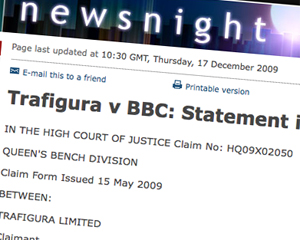The Independent published a correction yesterday concerning its front page story from September 2009 ‘Toxic shame’, which contained claims of individuals who alleged they had been injured as a result of illegal dumping of waste in the Cote d’Ivoire by a Trafigura ship:
The article stated that claimants had been maimed and wrongly suggested that, due to the settlement, claims of more serious injuries including miscarriages would not be tested in the High Court case. In fact such claims had already been withdrawn earlier last year. A joint statement issued by both parties in that case said that independent experts have been “unable to identify a link between exposure to the chemicals… and deaths, miscarriages, still births, birth defects … or other serious and chronic injuries”. The story featured the photograph of a woman with a severely scarred face, a condition which Trafigura says, and we accept, cannot therefore have been caused by the waste. We are happy to set the record straight.
Trafigura and its lawyers Carter-Ruck were at the centre of last year’s super injunction debate after Carter-Ruck abandoned an attempt to prevent the Guardian from reporting a parliamentary question about the company.
In December the oil trader ended its legal dispute with BBC Newsnight. The programme agreed to: apologise for allegations made about waste dumping in Côte d’Ivoire on air and pay £25,000 to a charity of Trafigura’s choice, as well as legal costs.
 Trafigura and its solicitors Carter-Ruck have now become synonymous with attempts to stifle free expression in the UK. First it gagged newspapers who attempted to report on waste dumping in Côte d’Ivoire with an injunction. Then it attempted to
Trafigura and its solicitors Carter-Ruck have now become synonymous with attempts to stifle free expression in the UK. First it gagged newspapers who attempted to report on waste dumping in Côte d’Ivoire with an injunction. Then it attempted to